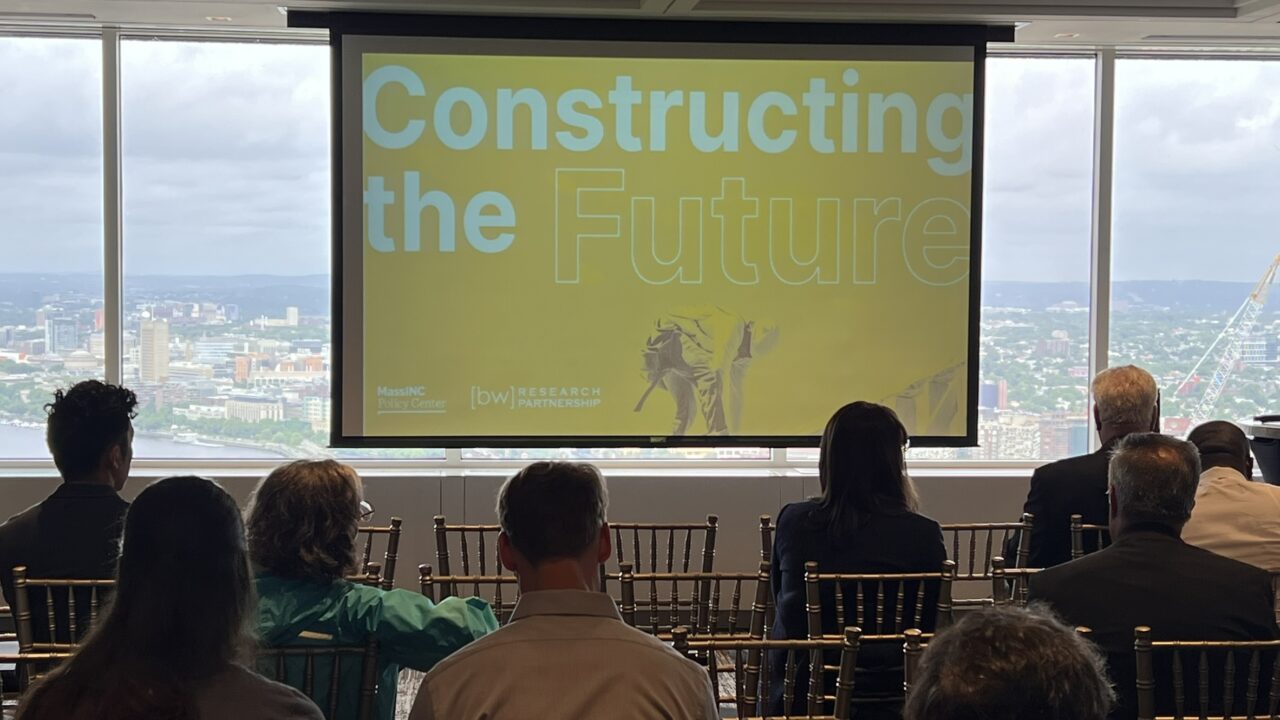On June 17, 2025, the MassINC Policy Center hosted a report release forum for Constructing the Future: Workforce Strategies to Help Massachusetts Meet Its Clean Energy and Housing Goals. The event brought together policy researchers, industry leaders, and educators to explore the future of the construction workforce in Massachusetts. The gathering offered a timely discussion grounded in new data and fueled candid dialogue.
We opened with remarks from Mark Erlich, a member of the MassINC Board of Directors, who set the tone by underscoring the stakes: hitting the commonwealth’s ambitious housing and clean energy targets hinge on a healthy, well-trained, and resilient construction workforce.
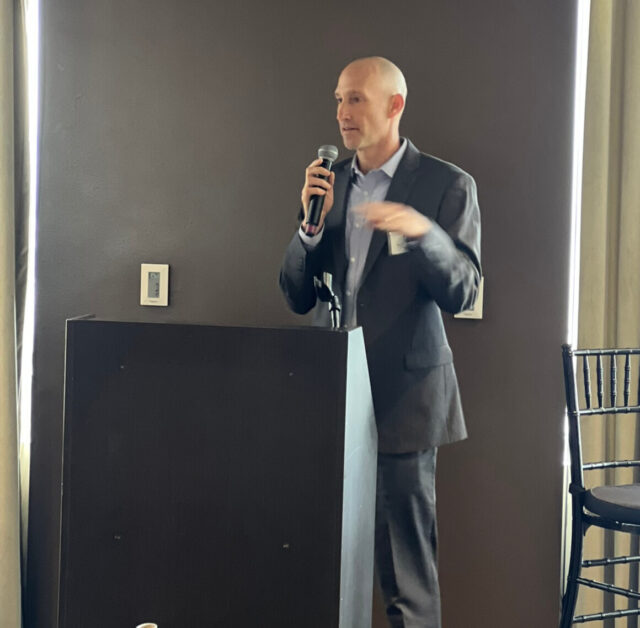
Next, Ben Forman, Director of the MassINC Policy Center, partnered with Phil Jordan, Vice President & Principal Researcher at BW Research Partnership, to present new findings. Their data painted a nuanced picture: while the state likely has enough skilled workers to meet housing and climate goals in the short term, that balance is fragile. Factors like an aging workforce and the depth of the current slowdown in commercial construction could tip the scales one way or the other.
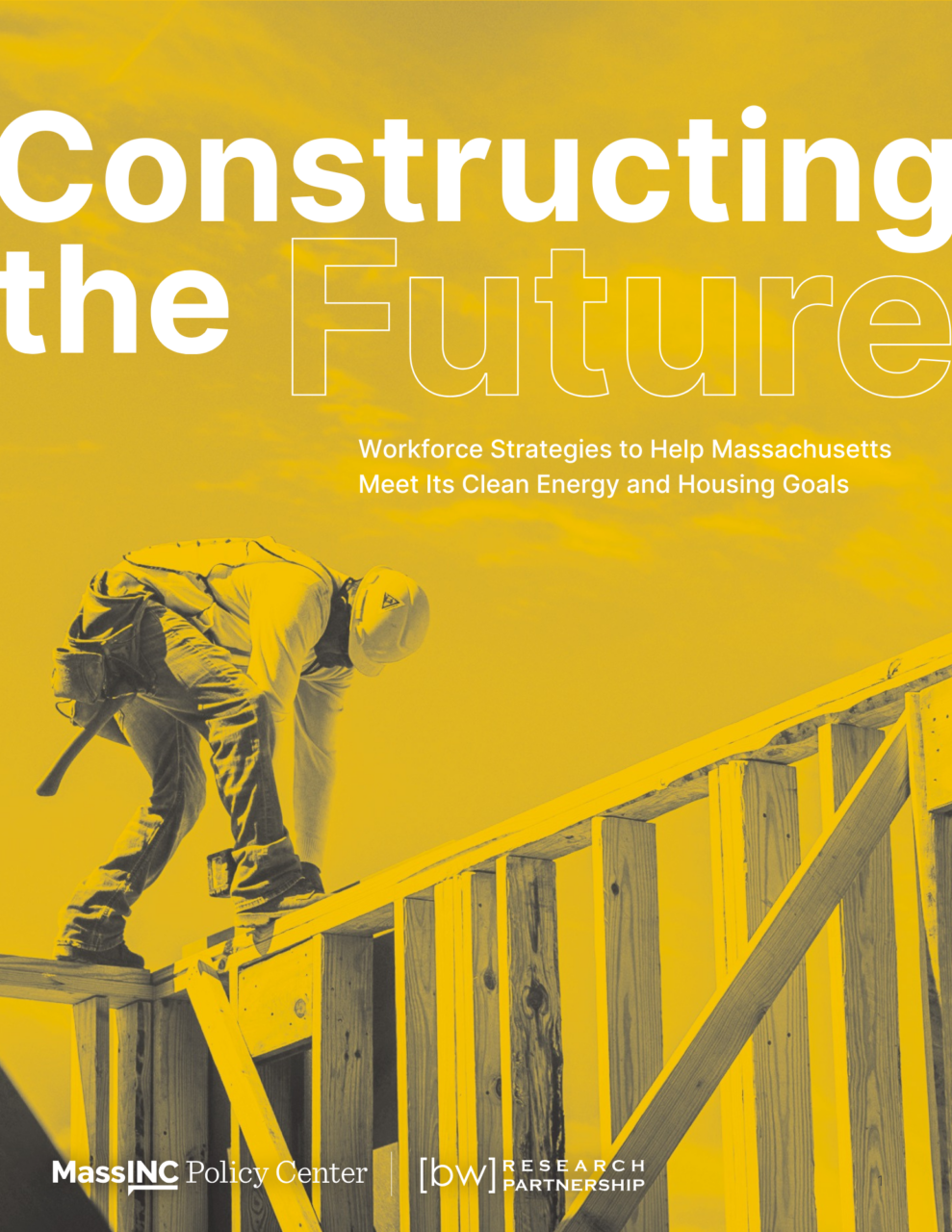
As Massachusetts invests billions in housing and clean energy infrastructure, we have a once-in-a-generation chance to close equity gaps in the labor market.
Constructing the Future: Workforce Strategies to Help Massachusetts Meet Its Clean Energy and Housing Goals outlines how the commonwealth can align workforce development with these historic investments ensuring residents are not just housed but hired to build the future.
Jennifer Applebaum, Managing Director of Workforce Development at the Massachusetts Clean Energy Center, moderated the panel of three leaders whose daily work intersects directly with these issues:
- Frank Callahan, President, Massachusetts Building Trades Unions
- Kristen Gowin, Executive Manager, Boston Chapter – National Electrical Contractors Association (NECA)
- Samantha Wood, Director of Strategic Innovation/Workforce Development, Greenfield Community College
Together, they unpacked the report’s findings through the lens of practice, policy, and lived experience.
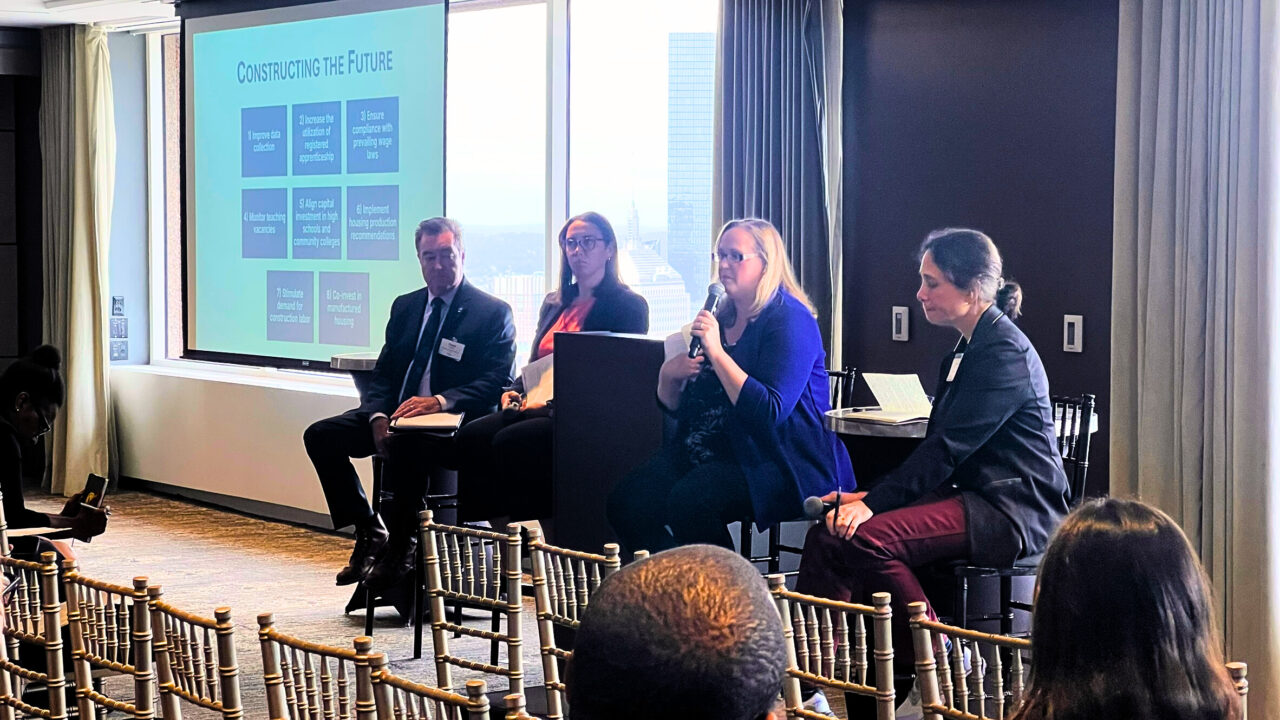
Kicking off the discussion, Frank Callahan highlighted the importance of aligning state policy and investment to keep skilled workers engaged amid economic slowdowns. Kristen Gowin added insights on how NECA contractors are already pivoting to support clean energy goals, while Samantha Wood explained how affordable housing demand drives the need for adaptable workforce development strategies.
Workforce and Business Composition
Turning to the challenge of an aging workforce, Samantha described Greenfield Community College’s efforts to bridge generational gaps—engaging older tradespeople to help train and inspire newcomers. Frank shared success stories from robust apprenticeship programs that continue to attract young applicants. Kristen emphasized the breadth of ongoing training and professional development offered through IBEW and NECA, ensuring workers remain highly skilled and technologically current.
Continuing to Prioritize Diversity
The conversation then focused on diversity, equity, and inclusion. Kristen discussed initiatives championed by NECA and IBEW to open doors for underrepresented groups. Frank spoke passionately about pre-apprenticeship programs like Building Pathways and Project Labor Agreements that have proven effective at broadening participation while benefiting local economies. Samantha underlined the vital role community colleges play—serving as accessible entry points and leveraging grant-supported training and new, free community college opportunities.
Audience Engagement and Forward-Looking Recommendations
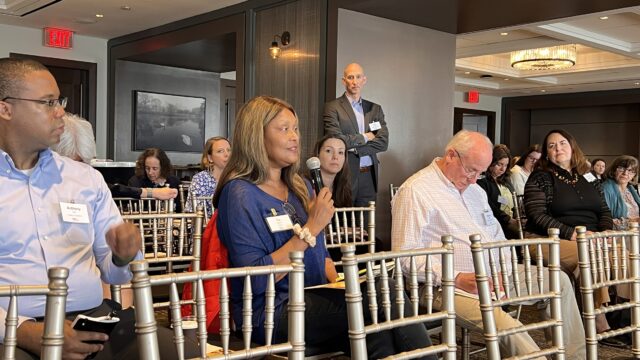
During the Q&A, the discussion touched on technological adoption and the potential of manufactured housing to boost productivity. Panelists explored how community colleges and apprenticeship programs can integrate training on emerging building technologies.
In closing, each panelist offered a concrete recommendation for the year ahead:
- Frank Callahan called for continued investment in apprenticeship and pre-apprenticeship programs.
- Kristen Gowin stressed the need to double down on upskilling and technology training.
- Samantha Wood advocated for sustaining free community college funding and expanding partnerships that create clear pathways into the trades.
Constructing the Future reinforced that while Massachusetts faces real challenges, collaboration across industry, education, and policy offers a path forward. By aligning resources, embracing innovation, and keeping equity at the center, the commonwealth can build a construction workforce ready to meet the moment.
Additional Resources
Presenters
Click to read presenter bio.
Ben Forman, Director, MassINC Policy Center
Benjamin Forman is MassINC’s research director. He coordinates the development of the organization’s research agenda and oversees production of research reports. Ben has authored a number of MassINC publications and he speaks frequently to organizations and media across Massachusetts. With a background in urban revitalization and sustainable growth and development, he is uniquely suited to the organization’s focus on strong communities and economic security.
Prior to joining MassINC in 2008, Ben oversaw strategic planning for the District of Columbia Department of Parks and Recreation, a large agency providing critical services to youth and families in neighborhoods throughout the city. He also worked as a research assistant at the Brookings Institution Metropolitan Policy Program in Washington, DC and Nathan Associates, a global economic development consulting firm.
As a graduate student, Ben was awarded a Rappaport Public Policy Fellowship and served in the City of New Bedford’s planning department. He also worked as a graduate research assistant on a multi-year longitudinal analysis measuring the impact of new information technologies on neighborhood social networks.
Ben graduated from Trinity College, Hartford in 1999 with a bachelor’s degree in economics. In 2004, he completed his master’s degree in city planning at the Massachusetts Institute of Technology. He lives in Boston with his wife Anne and two daughters, Eloise and Cecily.
Phil Jordan, Vice President & Principal Researcher, BW Research Partnership
With nearly two decades of specialized research experience in clean energy and workforce development analysis, Phil leads BW’s East Coast climate and energy practice, driving innovation and design thinking strategies. Renowned for his exceptional project management skills and analytical insight, Phil excels in communication, problem-solving, and guiding strategic initiatives with strong technical skills in survey research, policy development, and stakeholder engagement. At BW, Phil has played a pivotal role in transforming how businesses and governments address energy and workforce challenges. His creation of a groundbreaking methodology for tracking energy jobs in the U.S. and Canada has contributed significantly to understanding the economic benefits of the clean energy transition. His expertise in economic development and workforce gaps within innovation industries has driven industry-leading policy changes and implementation.
Phil has advised numerous notable international governments, including his work for the U.S. State Department, supporting allied nations in their clean energy transitions and industrial decarbonization efforts. His strategic counsel has supported nations on policy formulation aimed at fostering economic growth and optimizing workforce planning, and his leadership in policy development and supply chain analysis has made him a trusted voice in the global energy and innovation economy.
Driven by a passion for creating equitable opportunities for underrepresented communities, Phil is committed to using data-driven planning to ensure a fair and economically prosperous future for all people. Phil has developed replicable models for community benefit planning that ensure diverse perspectives are heard. His on-the-ground experience with domestic and international stakeholders has shaped his understanding of national and global contexts, making him an invaluable asset in the transition to a more sustainable and equitable economy.
Phil holds a B.S. in Psychology with a concentration in Resource Economics from the University of Connecticut and a J.D. with a focus in Environment and Land Law from Boston College. He is a LUMA-certified Human-Centered Design Practitioner and serves as a Senior Research Fellow at Harvard University’s Ash Center for Democratic Governance and Innovation.
Speakers
Click speaker name to read bio.
Jennifer Applebaum, Managing Director of Workforce Development, Massachusetts Clean Energy Center
Jennifer Applebaum is the Managing Director of Workforce Development at the Massachusetts Clean Energy Center. A former teacher and entrepreneur with a broad range of curriculum, training, and program innovation experience, Jennifer focuses on designing and scaling workforce development programs that address a range of barriers facing new entrants. Prior to her work at the MassCEC, Jennifer led a statewide youth employment program centered on progressive skill-building and a curriculum-based career readiness initiative that reached over 100,000 participants across multiple states. Jennifer completed her undergraduate degree at Barnard College of Columbia University and holds a master’s degree in education from City College of CUNY.
Frank Callahan, President, Massachusetts Building Trades Unions
Frank Callahan began his career in the labor movement with the Pioneer Valley Building and Construction Trades Council, AFL-CIO in 1990. He was appointed Legislative Director for the Massachusetts Building Trades Council, AFL-CIO in 1996, and elected President in 2007. He is a member of the International Union of Painters & Allied Trades Local 939. He is also Executive Vice-President of the Massachusetts AFL-CIO, Delegate to the Greater Boston Central Labor Council, President of the Construction Institute, a member of the School Building Advisory Board of the Massachusetts School Building Authority, a member of the Board of Directors of the Friends For Children and serves on the Blue Cross Blue Shield Labor Advisory Committee.
Mark Erlich, Fellow, Harvard Labor and Worklife Program, Harvard Law School; MassINC Board of Directors
Mark Erlich is a Wertheim Fellow at Harvard Law School’s Center for Labor & a Just Economy. He retired as Executive Secretary-Treasurer (EST) of the New England Regional Council of Carpenters, a 20,000 member organization, in March 2017. A member of Carpenters Local 40 since 1975, he worked at the craft as an apprentice, journeyman, foreman, and superintendent. While EST, Erlich chaired the New England Carpenters Benefits Funds and the New England Carpenters Training Fund. He was a Vice-President of the Mass AFL-CIO and Mass Building Trades. He served as a member on the Boston Zoning Board of Appeals and the Federal Reserve Advisory Council.
In addition to his career in the trades and the labor movement, Erlich has written and lectured extensively on labor issues. He is the author of three books, With Our Hands: The Story of Carpenters in Massachusetts (1986) and Labor at the Ballot Box (1990), both published by Temple University Press, and The Way We Build (2023) published by the University of Illinois Press. He has written dozens of essays, articles, and op-eds on contemporary union issues and labor history in academic publications and popular journals and newspapers.
Kristen Gowin, Executive Manager, Boston Chapter – National Electrical Contractors Association
Kristen Gowin is the Executive Manager for the Boston Chapter of the National Electrical Contractors Association (NECA), one of the largest Chapter’s in the country. In this capacity, Gowin represents nearly 200 signatory electrical construction companies in the Greater Boston, Maine and New Hampshire areas. She works to provide the membership with a myriad of services, including labor relations, contract negotiations and administration. She serves as a management trustee on various Pension, Health/Welfare & Annuity plans with funds that exceed a billion dollars.
In addition, Gowin and her team’s duties include external industry relations, government relations, education and training and general management of the chapter’s affairs. Gowin served as the Assistant Manager for six years before assuming the Executive Manger role in 2020. Gowin holds an MBA from Bentley University and a BA in political science and public relations from Quinnipiac University. She lives on the South Shore with her husband and four children.
